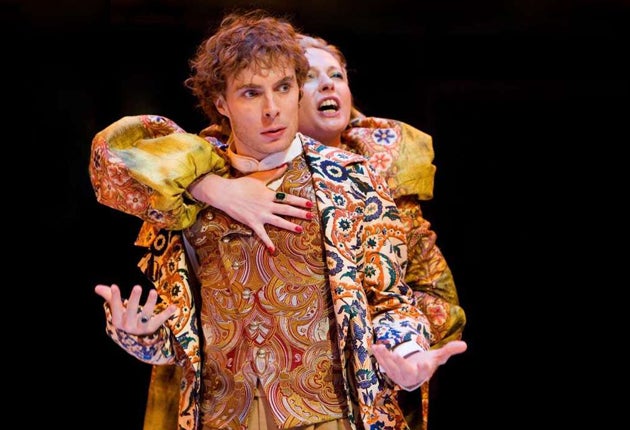The Comedy Of Errors, Royal Exchange Theatre, Manchester

Your support helps us to tell the story
From reproductive rights to climate change to Big Tech, The Independent is on the ground when the story is developing. Whether it's investigating the financials of Elon Musk's pro-Trump PAC or producing our latest documentary, 'The A Word', which shines a light on the American women fighting for reproductive rights, we know how important it is to parse out the facts from the messaging.
At such a critical moment in US history, we need reporters on the ground. Your donation allows us to keep sending journalists to speak to both sides of the story.
The Independent is trusted by Americans across the entire political spectrum. And unlike many other quality news outlets, we choose not to lock Americans out of our reporting and analysis with paywalls. We believe quality journalism should be available to everyone, paid for by those who can afford it.
Your support makes all the difference.On a bare white stage, in a minimalist production with the merest glimpses of Ephesian street-life, The Comedy of Errors could scarcely be delivered more freshly. It's cool rather than carnivalesque. The director, Roxana Silbert, whose experience, most recently at Paines Plough, lies mainly in new writing, has approached her first Shakespeare production with no obvious concerns as to how to "reinvent" the play. Her aim seems to be to pare it down to its most accessible. If you expect an associate director of the RSC to apply weighty interpretation, it's worth remembering that Silbert's brief at Stratford involves new drama rather than reimagining Shakespeare.
This Epheseus is timeless but in applying a flavour of the Ottoman Empire, Silbert has given it a contemporary slant without modernising it. The odd word may be changed, and even cut – at just over an hour and a half with no interval, both narrative and action are tightly paced – but the sense of exuberance and mystery in this early Shakespeare play is left firmly intact. The problem lies more in the fact that, in trying to reflect the multi-cultural society of the Turkish trading port, Silbert has assembled a multi-national company in which a melting pot of accents makes it difficult to pick up enough words.
Immediately after the god-like descent of Munir Khairdin's enthroned and lavishly robed Duke, Egeon's long speech about his lost children ought to draw the audience straight into the intrigue and confusion at the heart of the comedy. Even in the hands of the experienced Fred Ridgeway as Egeon, it's not always easy to follow the solemn tale of his sad quest. The words of those in several smaller roles, all deftly acted, are even harder to decipher. Bold though Silbert has been in her concept and casting, the focus surely has to be on the coherency and lucidity of the language. Only Jan Chappell as a grotesque Doctor Pinch and a purposeful Abbess is beyond reproach in her natural speaking rhythm.
When the comedy gets going, the delightful and often dizzying absurdities of having two sets of twins and a whole series of mistaken identities is skilfully handled. Sam Collings's Antipholus of Syracuse has an elfish appearance that fits well with his willingness to go along with everything that's offered to him. He's good too at expressing his subsequent alarm at being in a place where everyone appears to know him but he knows no one. Jack Farthing, his twin Antipholus of Epheseus, gives an urbane gloss to the husband locked out of his own home by his wife (a striking Orla Fitgerald) and later arrested.
In casting two sets of twins, Silbert has gone for actors of similar height and build and it works, especially with Michael Jibson's earnest Syracusan Dromio and Owain Arthur's Welsh-tinged Ephesian Dromio. Their bewildered reactions to the unreality of the situation and, eventually, to their discovery of each other, is artfully portrayed. Making both of them subject to panic attacks is a witty touch.
Luxurious textiles and rich colours are given a modern cut, resulting in costumes with a chic, designer look. McQueen and Westwood have been cited as influences by Silbert and in the combinations of checked plaid with its whiff of punk, of boldly cut patterns and fabulous materials, Anthony MacIlwaine has turned old styles into a riot of visually arresting and entertaining apparel. The use of perspex – making the central door scene visible to all in the in-the-round setting – and the subtle appliance of a revolve is effective. However, the clunky tilting of the stage is an unnecessary intrusion at the end of an amusing and absorbing piece of theatre.
To 8 May (0161 833 9833)
Join our commenting forum
Join thought-provoking conversations, follow other Independent readers and see their replies
Comments